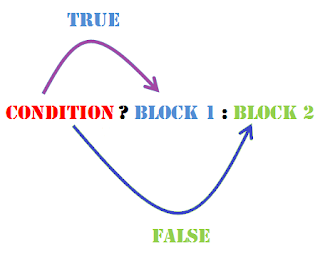Let's study them with examples, while reviewing the operators learned before.
===if/else if/else===
OCAJP>cat test.java
class test{
public static void main(String...args) {
int x;
int y = (x = 5) + 2;
if(y > x) {
y -= 6L; //y = int(y - 6L);
int a = y + 1; //compile
System.out.println(y+=x--/3 + y++); //3,4,3
//System.out.println(y+=(x--/3 + y++)); //3,4,3
//System.out.println(y= (int)(y + (x--/3 + y++))); //3,4,3
//x--;System.out.println(y= (int)(1 + (1 + 1))); //3,4,3
//System.out.println((y+=x--/3) + (y++));//4,4,3
System.out.println(x);
System.out.println(y);
System.out.println(y>x);//false
} else if (y == x) {
System.out.println(y == x);
} else {
System.out.println();
}
}
}
OCAJP>javac test.java
OCAJP>java test
3
4
3
false
ternary constructs or the ternary operator (? :) is the only opeator that takes three operands:
booleanExpression ? expression1 : expression2
OCAJP>cat test.java
class test{
public static void main(String...args) {
boolean x = true;
boolean y = false;
short i = 4;
if(x) i = 4; else i = -1000;
i = x?(short)4:(short)-1000; //equivalent to above
i = x?(short)4:(short)-1000; //equivalent to above
//i = x?4:-1000; //possible lossy conversion from int to short
//int j = x^y ? ++i++: 0; //not compile
int j = x^y ? ++i: 0;
System.out.println(j); //5
j = x&y ? i++ : 0;
System.out.println(j); //0
System.out.println(!x|y!=true); //true
//j = !x|y!=true ? i++ : 10L; //possible lossy conversion from long to int
j = !x|y!=true ? i++ : 10;
System.out.println(j); //5
}
}
OCAJP>javac test.java
OCAJP>java test
5
0
true
5


No comments:
Post a Comment